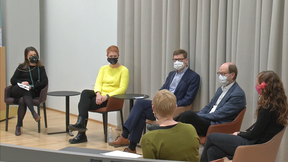Life in the Post-pandemic New Normal – The ND Future Forum 2020: Combatting COVID-19

The first event “We are in it together”, organized by the NDPHS, served as a platform for exchanging knowledge and experiences on how the COVID-19 pandemic has influenced health and healthcare systems in the Northern Dimension area. Its expert presentations and panel discussions led Dr Ülla-Karin Nurm, Director of the NDPHS Secretariat, to conclude that international cooperation in risk and crisis communication is needed to tackle misinformation about COVID-19.
Here, researchers have a key role in debunking pseudoscience, and authorities in ensuring that all of them communicate the same clear and easily understandable information to the people. Efficient and competent leadership is fundamental in establishing trust and in reducing anxiety and fear in society.
The second event of the Forum “Living in the New Normal after COVID-19” was organized by the NDI as a live-streamed expert panel discussion from Finland. The panel discussed how COVID-19 has changed the world and how permanent the change will be, and how this change relates to other societal trends like digitalization.
The panellists represented different societal sectors including business, research, and non-governmental institutions, and elaborated the topic from various perspectives such as the organization of work and education, mental health, and attitudes and values of people.
The panel underlined that despite all the detrimental impacts of the COVID-19, the pandemic has brought some positive outcomes. Societies witness new forms of equality as all citizens face the same threat and need to adapt to the new circumstances like the restriction of social relations.
The panel pointed to the pandemic as a shared social challenge that imposes a mental burden on all individuals, irrespective of the social status. At the same time, Finns have high trust in the capacity of authorities and the government to combat the crisis and expect clear instructions on how to act and behave in exceptional circumstances.
The COVID-19 crisis has generated new forms of collective action. The Finnish event industries is an example of a sector that was made visible and identifiable due to the crisis, as event organizers needed to join forces to draw politicians’ attention to the detrimental impact of the COVID-19 restrictions on their business.
Another positive outcome of the crisis is that it has generated social innovations and best practices that will prevail in the post-pandemic world. Most of these are linked with the use of digitalization in different fields including the organization of work, education, and the provision of healthcare services.
Digitalization has increased efficiency at work, as commuting and travelling to meetings is no longer required. The time savings enable multi-tasking and more efficient organization of one’s work. Also, in the fields of education and healthcare, new digital methods and platforms have proven beneficial and will remain in use after the pandemic.
At the same time, the panel pointed out that crisis-borne practices related to digitalization are not equally accessible to everyone or cannot completely replace traditional ways of organizing work and producing services. The crisis showed that not all professions can be done remotely and that schools did not have the digital equipment or experience to switch to digital distance learning.
The panellists shared the view that it is important to ensure that vulnerable groups, e.g. pupils with special needs or mental healthcare customers with serious disorders, are met face-to-face. It was highlighted that the workplace is a social community, and virtual platforms and communities cannot replace face-to-face interaction. A future trend will most likely be hybridization, which combines digital and traditional forms of producing services and organizing work and education.
In his concluding remarks, Finland’s Ambassador for Barents and Northern Dimension Jari Vilén welcomed the insights from the panel and perceived them as a valuable contribution to the governmental work on COVID-19 strategies. This showed the relevance of the ND Future Forums as bridging research and policy-making at a very concrete level.
Read more news

‘Mesoscale’ swimmers could pave way for drug delivery robots inside the body
Researchers have discovered how tiny organisms break the laws of physics to swim faster — such secrets of mesoscale physics and fluid dynamics can offer entirely new pathways for engineering and medicine.
Hanaholmen’s 50th anniversary exhibition lives on online – making the history of Finnish–Swedish cooperation accessible worldwide
MeMo Institute at Aalto University has produced a virtual 3D version of the anniversary exhibition of Hanaholmen.
Research reveals the economic significance of family firms in Finland
The findings show that, on average, family firms are more profitable and financially resilient than other firms – and also invest more.






